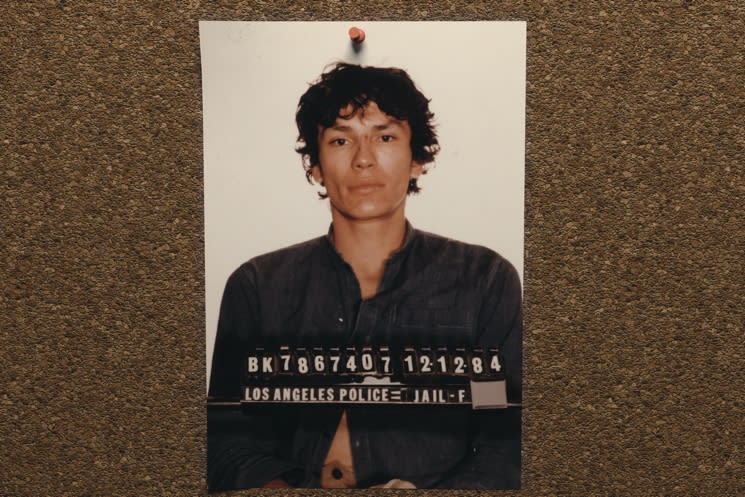It's the summer of 1985, and the city of Los Angeles is being terrorized by the Night Stalker. A serial killer, serial rapist, kidnapper and pedophile whose choice of victims followed an incoherent pattern of men, women, and children from ages 6 to 82 — a range unlike anything the Los Angeles Police Department had ever encountered. A summer-long hunt ended in the eventual arrest and imprisonment of Richard Ramirez, an remorseless sadist who claimed he worshipped the devil.
The focus of Night Stalker: The Hunt for a Serial Killer is not on the murderer himself, but on Gil Carrillo and Frank Salerno, the two police officers who led the Ramirez investigation and capture. The docuseries does a fantastic job at humanizing the cops running the hunt, as both men recount the months of riveting but horrifying events around the discovery, hunt, and eventual entrapment of Ramirez that led to Carrillo's family going into hiding. This Netflix original also brings together some survivors of the killer's terror, as well as interviews with the family members of his victims — which, if not so devastating and moving, could have been viewed as predatory.
The true crime genre has an issue with the glamorization of its subjects, and unfortunately, Night Stalker also fell into that murky moral quandary. The bright lights and moody city nights aesthetically tossed about the series don't bring to mind the real life Ricky — a lanky, disheveled man with brown teeth, rotting gums due to a poor diet consisting of candy and fast food, and a horrific body odor repeatedly described as "goat-like."
Quotes from Ramirez's post-capture interviews are played across the screen during B-roll shots, written in neon purple lettering seemingly plucked straight from a teenager's Tumblr. A vibe fit for Riverdale doesn't belong in a series about this infamously disgusting criminal, and directly awards Ramirez with the legacy he wanted. The egomaniac likened himself to the bad boy figures he looked up to in classic rock, like AC/DC, Led Zeppelin, and Guns N' Roses — but his attempts to fit in with the cool guys were inevitably futile, as Ramirez's shades, smirks, pop-Satanic philosophies and flair for the dramatics were nerdier than they were edgy.
Without a proper explanation of Ramirez's background, traumas, and why his fantasies are what they are, the dweeb gains mystique. He murdered at least 14 people and assaulted 11, and those atrocious crimes need to be handled with severity — but unless you break down the myth and strip the perpetrators of their power, documentaries like Night Stalker feed into the vision of a powerful, nightmarish demon that Ramirez hoped he'd be remembered as.
(Netflix)The focus of Night Stalker: The Hunt for a Serial Killer is not on the murderer himself, but on Gil Carrillo and Frank Salerno, the two police officers who led the Ramirez investigation and capture. The docuseries does a fantastic job at humanizing the cops running the hunt, as both men recount the months of riveting but horrifying events around the discovery, hunt, and eventual entrapment of Ramirez that led to Carrillo's family going into hiding. This Netflix original also brings together some survivors of the killer's terror, as well as interviews with the family members of his victims — which, if not so devastating and moving, could have been viewed as predatory.
The true crime genre has an issue with the glamorization of its subjects, and unfortunately, Night Stalker also fell into that murky moral quandary. The bright lights and moody city nights aesthetically tossed about the series don't bring to mind the real life Ricky — a lanky, disheveled man with brown teeth, rotting gums due to a poor diet consisting of candy and fast food, and a horrific body odor repeatedly described as "goat-like."
Quotes from Ramirez's post-capture interviews are played across the screen during B-roll shots, written in neon purple lettering seemingly plucked straight from a teenager's Tumblr. A vibe fit for Riverdale doesn't belong in a series about this infamously disgusting criminal, and directly awards Ramirez with the legacy he wanted. The egomaniac likened himself to the bad boy figures he looked up to in classic rock, like AC/DC, Led Zeppelin, and Guns N' Roses — but his attempts to fit in with the cool guys were inevitably futile, as Ramirez's shades, smirks, pop-Satanic philosophies and flair for the dramatics were nerdier than they were edgy.
Without a proper explanation of Ramirez's background, traumas, and why his fantasies are what they are, the dweeb gains mystique. He murdered at least 14 people and assaulted 11, and those atrocious crimes need to be handled with severity — but unless you break down the myth and strip the perpetrators of their power, documentaries like Night Stalker feed into the vision of a powerful, nightmarish demon that Ramirez hoped he'd be remembered as.
